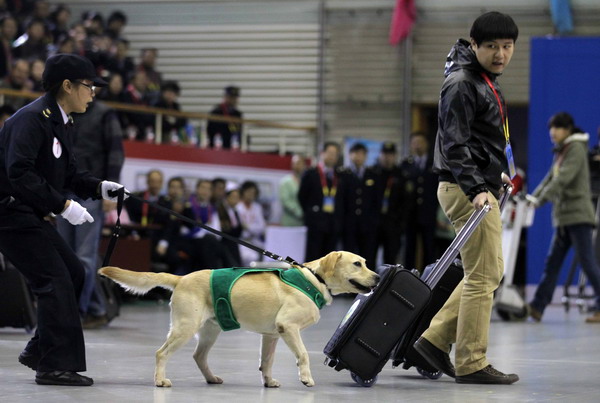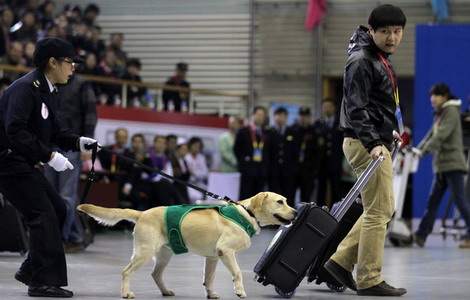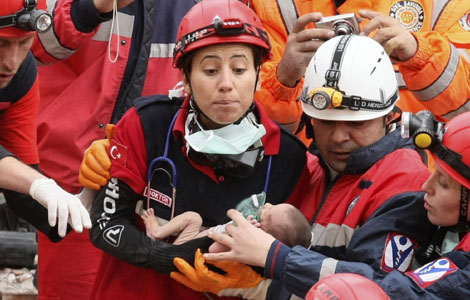Dogs finally get their day
Updated: 2011-10-26 08:13
By Zhou Wenting (China Daily)
|
|||||||||||
|
 A trainer leads a dog to check the luggage of a man pretending to be a passenger during the first national skills competition of quarantine detective dogs in Beijing on Tuesday. [Photo by Wang Jing / China Daily]
|
Man's best friend improves airport safety and speeds up customs
BEIJING - Xiaolong shuttled between seven people carrying luggage, his nose closely sniffing each box then rapidly moving on. Suddenly he sat down in front of one bag and looked up at his accompanying trainer.
A referee opened the bag, and found fruit in there.
The search won warm applause for Xiaolong, a 5-year-old Labrador retriever who was one of the nine participants in the first national skills competition of quarantine detective dogs, which was held on Tuesday.
China has used quarantine detective dogs in entry-exit inspection and quarantine for 10 years, starting with four dogs at the Beijing Capital International Airport in 2001. Now 180 dogs are used in 20 provinces and municipalities for entry-exit quarantine inspection.
"Whenever an international flight arrives, I take Xiaolong to the luggage transmission band to check if passengers hide articles on the banned list in their luggage bags," said Chen Qi, the trainer of Xiaolong, who has worked at the airport in Fuzhou, Fujian province, for four years.
"If he signals he has found something by sitting down, I will inform inspectors to open the box to double check," Chen added.
Chen said there are four dogs at the Fuzhou airport, and they work every day.
Inspection officers said these dogs have played a major role in improving inspection accuracy and the detection rate of forbidden articles.
"The assistance from dogs has greatly remedied the insufficiency of traditional manual inspection and X-ray machines, and reduced the occurrence of negligence," said Wei Chuanzhong, deputy chief of the General Administration of Quality Supervision, Inspection and Quarantine.
According to the administration, more than 31,000 batches of pests were intercepted across the country in 2010, an increase of nearly 26 percent from last year. More than 40 percent of them were found by the dogs.
The speed of passengers going through customs has also been accelerated since dogs were deployed to check luggage. Officers now do not need to unpack each bag to look inside.
Labrador retrievers, springer spaniels and beagles are trained to become quarantine detective dogs in the country. Trainers said they are chosen for their gentle personality and good communication with people.
"They are the professional search dogs that are internationally recognized. They don't attack people, and are easy to control," said Fan Jifu, trainer of a 9-year-old beagle that has worked at the airport and docks in Xiamen, Fujian province, for six years.
Trainers said the role of the dogs in quarantine inspection is irreplaceable.
"The sense of smell of dogs is more discriminating than any advanced instrument. They are genius inspectors that only need good training," Chen said.
In April 2005, quarantine detective dogs in Guangzhou, Guangdong province, seized contraband duck eggs - carried by passengers arriving from Vietnam - which were found to contain the highly pathogenic avian influenza virus. It was the first time a major animal epidemic was intercepted by passenger checks at customs by quarantine detective dogs.
|
Training for inspection BEIJING - A 6-month-old dog is at the ideal age to begin training for quarantine detection, said veteran trainers, who select candidates by their physiques and dispositions. "In addition to a robust figure, we prefer dogs with a strong desire to hold articles in their mouths and strong senses of possession," said Chen Qi, who has been a trainer of quarantine detective dogs for six years. "Only male dogs are recruited, because a female dog will make all the males circle round her out of animal instinct," Chen said. "We repeatedly tell them which is the target, and which is not, to help them keep the smell of the targets in mind," Chen said. "We keep rewarding them in various ways, such as verbal encouragement, food and playing with a ball," said Liu Xiaodong, a trainer from Yantai, Shandong province. It is common for the dogs to make false detections because of smell generalization, trainers say. "For example, I use milk powder as a detection target in training, and the dog may alert me when it finds cheese and cake in passengers' luggage at work," Chen said, adding a trainer's job is to find mistakes and make corrections. OVERVIEW OF CHINA’S WORKING DOGS • Guide Dogs China did not have its fi rst training center for guide dogs until May 2006. In the following fi ve years, 21 guide dogs were successfully trained by the center in Dalian, Liaoning province. Popular guide dogs include Labrador retrievers and German shepherds. • Search and Rescue Dogs Used to find and rescue missing people or objects. Some dogs are even specially trained to fi nd human remains. As physical energy is required, the search and rescue dogs are larger, such as the Newfoundland. • Detection Dogs These dogs have been widely adopted by China’s public security authorities, customs and border inspectors to nail illegal drugs. Popular dogs to use include German shepherd, Belgian malinois and Kunming wolfhound. • Security Dogs They are specially trained to sniff out bombs, explosives and accelerants. Moderate-sized dogs are often used as security dogs, as their appearance may cause fewer passengers to feel anxious. • Police Dogs Dogs in China are widely used to assist police in their work, such as investigating criminal cases and chasing suspects. Seven kinds of dogs are used by the Chinese police, including German shepherds, Belgian malinois and Rottweilers. |
Hot Topics
New sex education textbooks were introduced to pupils in Shanghai on Monday after numerous debates on early-age sex education in China.
Editor's Picks

|

|

|

|

|

|







